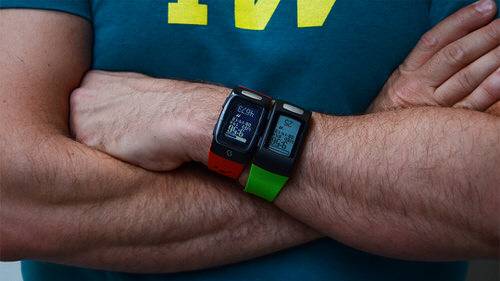
If and when Apple ever comes out with a wearable computer, the term “watch” may not necessarily apply.
According to reports, Apple is going whole hog into health and fitness for its long-rumored wearable device. This morning, a new job listing on Apple’s website called for a “User Studies Exercise Physiologist” who would design, test and run user studies of fitness tracking, including calories burned, metabolic rate, cardiovascular fitness and “measurement/tracking and other key physiological measurements.” That job listing subsequently vanished, although Mark Gurman from 9to5Mac posted a screenshot.
Such physiologists and related sensor and health experts are expected to contribute to an app in the forthcoming version of iOS 8 called “Healthbook,” Gurman reported last week. Apple already has fitness tracking capabilities built into the iPhone 5S via its M7 motion co-processor, and Healthbook will be the software manifestation of Apple’s fitness hardware.
Apple has met with the Food and Drug Administration to discuss mobile medical applications, according to a report in the New York Times. That makes sense if Apple is working on applications that may touch on healthcare issues, as federal laws concerning the gathering, storage and sharing of health information are quite strict. Moving into a field like healthcare is not something a company like Apple would do haphazardly.
See also: Apple May Be Giving Fitness-App Makers The Bluetooth Blues
It does look like Apple may be acknowledging that smartwatches are not going to recapitulate the capabilities of smartphones any time soon. Today’s smartwatches are generally falling into one of two distinctive categories: communication devices like Pebble, Samsung’s Galaxy Gear and the Qualcomm Toq and fitness devices like FitBit and the Nike FuelBand. From the reports so far, it appears that Apple is focusing on the latter category.
U.S. healthcare is a $2.8 trillion industry, counting everything from insurance to pharmaceuticals to doctor and hospital fees and so on. Technologists have long considered health and fitness ripe for “disruption” by lower-cost, information-centric approaches, but most attempts so far have run into the shoals of federal regulations and heavily entrenched, bureaucratic incumbents that have proven amazingly resistant to change.
Apple’s Wearable Challenges
The technology for the all-on-one smartwatch is not really mature enough for Apple to create a device that is both smartphone and wearable fitness tracker. So, Apple has to establish priorities.
First, it needs to uphold the software and hardware design principles that have made it the most profitable computer company in the world. That may mean a curved display that demonstrates Apple’s usual flair. It will certainly mean packing a device with enough power to collect relevant data and deliver simple but intuitive functions. At a minimum, that means Bluetooth, GPS, a variant of the M7 motion processor (likely an ARM-based Cortex processor of some type) and an accelerometer.
Battery life will be crucial; almost certainly, so will wireless charging.
See also: Why The All-In-One Smartwatch Isn’t Happening Any Time Soon
Second will be a platform for developers to build on, the same way they do on iOS in the smartphone and tablet world. Apple will likely have several launch partner apps for its fitness band, with Nike a likely suspect (Apple CEO Tim Cook sits on Nike’s board) as well as apps like RunKeeper (one of the first fitness trackers in the App Store). If Apple makes its fitness tracker a platform to build on top of—like it did with the iPhone—it could go a long way into creating interest for the product.
The third challenge may be the most difficult: getting the American health system to adopt an Apple-made fitness device as a go-to source for health monitoring. Imagine a doctor prescribing a health tracker to a patient to monitor cardiovascular health with all of that information directly shipped back to the doctor’s computer. This is the sort of idea that would lead Apple straight into discussions with the FDA.
Apple hasn’t rushed into the wearable market the way companies like Samsung and Sony have. Apple is taking a classic, pragmatic approach that could ultimately yield not just a consumer-grade fitness tracker, but a life companion device designed to keep you healthy.

















